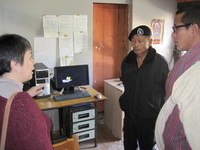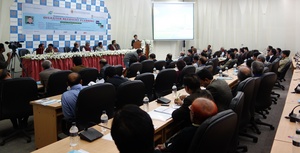Since 2009, ADRC has been conducting DRR Policy Peer Reviews to help develop the DRR capacity of ADRC-member countries through the promotion of information sharing and the strengthening of relationships among member countries. The target project selected for review this year, the sixth since the Peer Review process was launched, is a project titled "Integrating Cultural Heritage and Disaster Risk Reduction (Disaster Preparedness and Sensitization Training program on Dzong (Fortress) Safety at Dagana)". After the country report was submitted, a reviewer team comprised of the following two individuals visited Bhutan to conduct interviews: Ms. Yuko Nakagawa (Executive Director, NPO SEEDS Asia), and Mr. Junji Moriwaki (ADRC Researcher).
The team visited the Ministry of Home & Culture Affairs Department of Disaster Management (DDM) and so on, which is involved in DRR activities, to examine its DRR development efforts in Bhutan. The team also conducted inspections of Dagana District, where is a place of DRR drills were carried out, after which it prepared a draft report of its survey results highlighting its specific findings (e.g., "5 days training increased the awareness and knowledge on fire safety and DRR to monks and administrative officers in Dagana Dzong which was not there.", "Good coordination among relevant agencies such as DDM, fire division, and district administration made smooth implementation." and "Well understanding of the Governor and Disaster Focal person of the district office for the need of DRR and willingness for their continuous efforts.") and recommendations (e.g., "Fire is not the only hazard in Dagana. Training and raising awareness on multi hazard, especially on earthquake should be sought." and "Collaboration between school and community on DRR drills can be sought."). A workshop was also held to gather opinions and comments used in finalizing the report as well as to introduce the importance of community involvements and education in schools for enhancing the DRR, with local participants. This proved to be a very good opportunity for participants to share information and ideas with one another.
After its survey mission ends, the reviewer team compiles a survey report, which it sends to the countries examined as well as to other ADRC member countries, so as to enhance cross-fertilization.
ADRC would like to express its sincerest gratitude to all of those who have made such important contributions to this project.
(2014/12/22 19:40)



